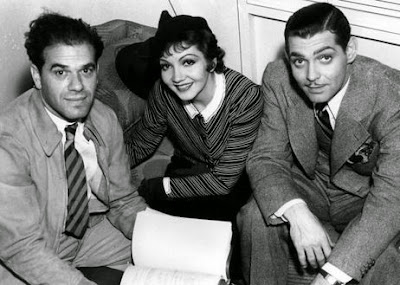The Siren is still writing, oh yes she is. Here is an excerpt from her essay about It Happened One Night, part of the Blu-Ray package now available from the fine and fabulous folks at Criterion. You can read the Siren's essay in its entirety at their website.
It's been a particularly hard week for the world beyond the movie screen, and indeed a hard year. Frank Capra's joyous masterpiece was made at a time that was, in many respects, far harsher. Watching the film again (and again) and writing about the things that make it great was an uplifting experience. This movie has a true democratic spirit. This long weekend, you could do far worse than to watch It Happened One Night.
No matter what they watch, or whether or not they celebrate this American holiday, the Siren sends all her patient readers warm and loving Thanksgiving wishes.
Almost eighty years ago, the Academy Awards saw a clean sweep of its top five categories—screenplay, actor, actress, director, and picture—not by a grandiose epic or searing social drama but by a romantic comedy, a sparkling, gossamer thing about the love of a pampered heiress for a just-fired, often-drunk scamp of a reporter.
The film begins with the heiress already married to an obvious fortune hunter. Her father has imprisoned her on his yacht, demanding that she accept an annulment. She runs away on a Greyhound bus and finds herself mixed up with that scoop-hungry reporter. They spend one night together, then another. They fall in love. A bare plot synopsis hasn’t got much heft. And yet after all these years, It Happened One Night (1934) is almost universally acknowledged as one for the ages, its gorgeous spirit haunting all the romantic road trips, all the unlikely courtships, all the bickering, smitten couples that have come after.
It’s a movie both escapist and egalitarian. Director Frank Capra, that great American cheerleader, assures everyone that this fair country’s wide-open spaces, while not without peril, are full of fellowship and democracy. Our land can bring out the good in Ellen Andrews (Claudette Colbert), who is so spoiled that, in the first scene, she flings an entire steak dinner out a porthole. Her father (Walter Connolly) delivers a roundhouse slap, a moment that shocks them both. But for a Great Depression audience, one that Franklin Delano Roosevelt would still describe, in 1937, as “one-third . . . ill-housed, ill-clad, ill-nourished,” wasting a lavish meal would have bordered on the criminal. Comeuppance must be on its way — and so it is, in the guise of reporter Peter Warne (Clark Gable). When Pete is introduced, he’s on the phone with the editor who canned him. As an appreciative audience gathers to listen, Pete tilts a bottle of booze down his throat and defends an unprintably bad story with “That was free verse, ya gashouse palooka.” He remains fired, of course, wasting something else that was scarce and precious in 1934: a job.
[snip]
An ideal romantic comedy doesn’t ignore reality; it converses with it. The Depression may be softened by moonlight and shining eyes, but it is everywhere visible in It Happened One Night, from the woman on the bus who faints from hunger to the freight car full of hoboes who wave back at a joyous Pete as he races to propose to Ellie. One of the loveliest shots in the movie is the exquisite track that follows Ellie as she makes her way to the autocamp’s communal shower, while children chase each other and weary adults prepare to get back on the road.

Không có nhận xét nào:
Đăng nhận xét